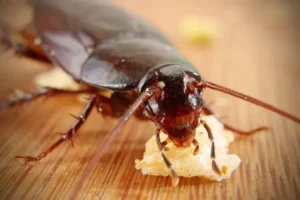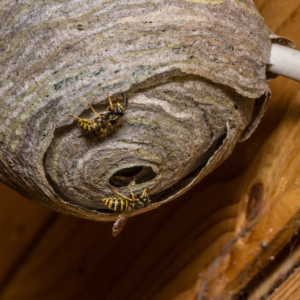Each wasp colony has the same hierarchy; an egg-laying queen, sterile female workers, and male drones and workers. A wasp colony’s cycle begins in the early spring, concludes in winter, and may continue through several seasons. The colony’s entire life cycle begins with the birth of a new queen and ends with her death. The queen devotes herself to egg-laying while workers build the nest, forage for food and tend to larvae.
As spring passes and summer rolls in, workers are continuously laid and produced until late summer until early autumn, when drones begin to outnumber workers significantly. As worker wasps near the end of their life cycle, taxed from raising and feeding larvae and drones, they will start seeking refuge and sweet or fragrant food sources in Kiwi households. At this time, drone wasps take to the skies, and the queen goes into hibernation, signalling what is to become; wasp season.
Disproportionately Dense Wasp Populations
Originating in Eurasia, the German wasp (Vespula germanica) and the common wasp (Vespula vulgaris) have spread throughout New Zealand, reaching troublingly high densities of up to 40 nests per hectare; populations start to climb through spring and peak in supper. Thriving nests can house over 20,000, which equates to approximately 800,000 wasps living in the area of a rugby field.
The disproportionate abundance of German and common wasps in New Zealand indicates a significant disruption of native biodiversity and is estimated to the economy is approximately $133 million annually.
Cultural And Economical Impacts
Insects and reptiles (ngārara) hold deep cultural symbolism and significance in the Māori worldview (te ao Māori). The belief is that this genealogy connects them to deities (atua) that symbolise the interconnectedness of the forests and the birds.
This conveys the importance of balance within eco-systems; the issue of managing Invasive predator species is critical in New Zealand, both culturally and economically. Wasp swarms cause damage to fruit orchards, vineyards and bee farms. Although a lot of this can be mitigated by monitoring the seasonal changes in a colony’s life cycle, swarms also prey on native invertebrates, insects, larvae and vegetation that serve as food sources for birds and reptiles; this has a knock-on effect on the eco-system. Any threat to taonga species that are fundamental to the cultural practices and identity of the Maori people holds a place of importance when it comes to pest management.
Wasps are temperamental and territorial by nature; in residential and commercial settings, when in close proximity to homes and businesses, wasp swarms become a health hazard. Swarming wasps don’t exactly present an enjoyable outdoor environment in the spring and summer months; this can affect the productivity and appeal of businesses and outdoor entertainment areas.
Returning The Balance
But this does not discount the valuable role wasps play within an eco-system because they also help control harmful insect species, especially blowflies and arthropods, like aphids and caterpillars that feed on crops. This means of biocontrol is a service worth an accumulative amount of $416 billion annually to the agricultural industry worldwide.
Understanding that eco-systems are delicate and require balance in order to sustain, and understanding that we as proud kiwis have a responsibility towards our environment, proud of our heritage, proud of our beautiful and diverse landscapes, proud of the way Aotearoa, New Zealand, our home, provides us with sustainable industries. New Zealand has embraced a shift from pest control toward responsible pest management, working with the land, with eco-systems.
Measured, Targeted And Responsible Pest Management
We provide a wide range of pest management solutions and commercial pest management programs without contracts at the Pest Man. Modern pest control is measured, controlled, targeted and responsible. All of our products and practices adhere to EPA NZ health and safety guidelines and regulations; additionally, we are registered and insured members of the Pest Management Association NZ.
Our pest management services are offered throughout Wellington, Porirua, Kapiti, Palmerston North, Horowhenua, Manawatu, and the surrounding areas. Call us at 0800 737 810 for a free, no-obligation quote today.



